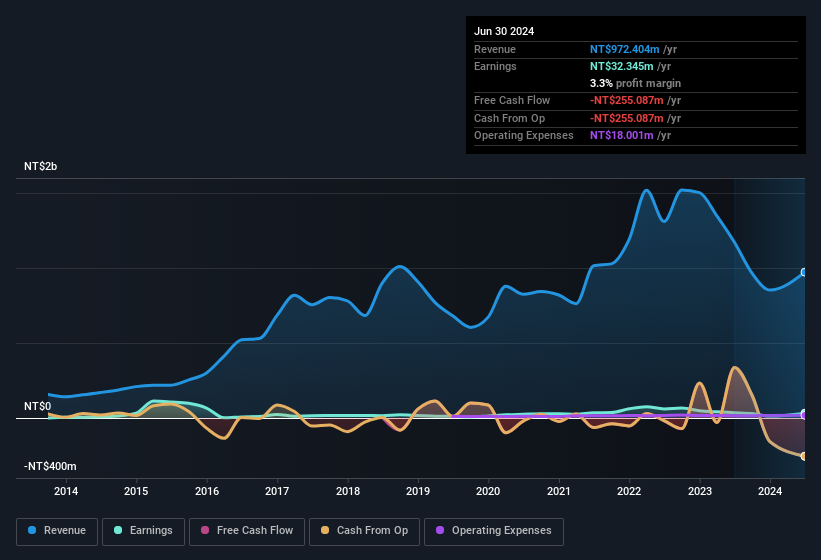- Taiwan
- /
- Electrical
- /
- TWSE:1516
We Think That There Are More Issues For Falcon Power (TWSE:1516) Than Just Sluggish Earnings

Investors were disappointed by Falcon Power Co., Ltd.'s (TWSE:1516 ) latest earnings release. We did some analysis, and found that there are some reasons to be cautious about the headline numbers.
View our latest analysis for Falcon Power

Examining Cashflow Against Falcon Power's Earnings
As finance nerds would already know, the accrual ratio from cashflow is a key measure for assessing how well a company's free cash flow (FCF) matches its profit. To get the accrual ratio we first subtract FCF from profit for a period, and then divide that number by the average operating assets for the period. The ratio shows us how much a company's profit exceeds its FCF.
Therefore, it's actually considered a good thing when a company has a negative accrual ratio, but a bad thing if its accrual ratio is positive. While it's not a problem to have a positive accrual ratio, indicating a certain level of non-cash profits, a high accrual ratio is arguably a bad thing, because it indicates paper profits are not matched by cash flow. That's because some academic studies have suggested that high accruals ratios tend to lead to lower profit or less profit growth.
Falcon Power has an accrual ratio of 1.32 for the year to June 2024. Statistically speaking, that's a real negative for future earnings. And indeed, during the period the company didn't produce any free cash flow whatsoever. Even though it reported a profit of NT$32.3m, a look at free cash flow indicates it actually burnt through NT$255m in the last year. It's worth noting that Falcon Power generated positive FCF of NT$337m a year ago, so at least they've done it in the past. The good news for shareholders is that Falcon Power's accrual ratio was much better last year, so this year's poor reading might simply be a case of a short term mismatch between profit and FCF. Shareholders should look for improved cashflow relative to profit in the current year, if that is indeed the case.
Note: we always recommend investors check balance sheet strength. Click here to be taken to our balance sheet analysis of Falcon Power.
Our Take On Falcon Power's Profit Performance
As we have made quite clear, we're a bit worried that Falcon Power didn't back up the last year's profit with free cashflow. For this reason, we think that Falcon Power's statutory profits may be a bad guide to its underlying earnings power, and might give investors an overly positive impression of the company. In further bad news, its earnings per share decreased in the last year. At the end of the day, it's essential to consider more than just the factors above, if you want to understand the company properly. So while earnings quality is important, it's equally important to consider the risks facing Falcon Power at this point in time. Be aware that Falcon Power is showing 2 warning signs in our investment analysis and 1 of those is a bit unpleasant...
This note has only looked at a single factor that sheds light on the nature of Falcon Power's profit. But there is always more to discover if you are capable of focussing your mind on minutiae. Some people consider a high return on equity to be a good sign of a quality business. So you may wish to see this free collection of companies boasting high return on equity, or this list of stocks with high insider ownership.
New: AI Stock Screener & Alerts
Our new AI Stock Screener scans the market every day to uncover opportunities.
• Dividend Powerhouses (3%+ Yield)
• Undervalued Small Caps with Insider Buying
• High growth Tech and AI Companies
Or build your own from over 50 metrics.
Have feedback on this article? Concerned about the content? Get in touch with us directly. Alternatively, email editorial-team (at) simplywallst.com.
This article by Simply Wall St is general in nature. We provide commentary based on historical data and analyst forecasts only using an unbiased methodology and our articles are not intended to be financial advice. It does not constitute a recommendation to buy or sell any stock, and does not take account of your objectives, or your financial situation. We aim to bring you long-term focused analysis driven by fundamental data. Note that our analysis may not factor in the latest price-sensitive company announcements or qualitative material. Simply Wall St has no position in any stocks mentioned.
About TWSE:1516
Flawless balance sheet and slightly overvalued.
Market Insights
Community Narratives




